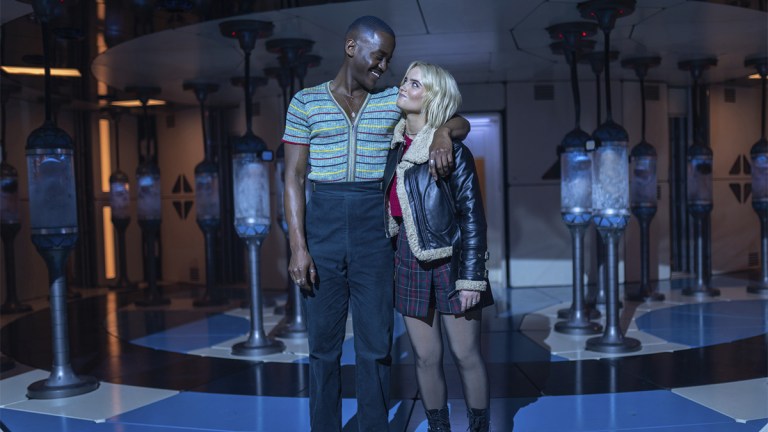Doctor Who’s Stars Were Freaked Out by “Horrendous, Demonic” Rubber Space Babies
Ncuti Gatwa and Millie Gibson won’t ever forget their creepy jelly baby co-stars.

Warning: contains spoilers for Doctor Who series 14 episode 1 “Space Babies”.
The new series of Doctor Who begins with The Doctor and Ruby encountering an abandoned spaceship that doubles as a daycare. The babies sit in computerized strollers while a computerized nanny takes care of them. The time travelers have to figure out why the babies were abandoned and who or what caused the human crew to flee or die.
Den Of Geek interviewed Ncuti Gatwa and Millie Gibson to find out the behind-the-scenes tricks used to make the titular “Space Babies” come alive on screen.
Gatwa and Gibson describe “Space Babies” as the most technically challenging episode they filmed in series 14. “There were 12 real babies and then they’d get shipped off, and then we’d get these rubber jelly babies, that kind of looked like demon versions of the babies,” Gatwa says. The dolls apparently had an awkward plastic feel to them. “It was just horrendous,” says Gibson.
The swaps of the real infants for dolls are due to UK law and actor’s union restrictions limiting how many hours child actors can work in a given day. Each child has a performance licence and productions have to report how much time each child spends on set and when they have a break to be with their parent or assigned guardian. Doctor Who isn’t alone in this regard, Call the Midwife also heavily relies on a mix of real babies and prosthetic models as every episode shows newborns and infants.
While the real babies are easier for actors to hold, their age obviously limits their ability to act. “You can’t control their movements, they’re not professionals,” Gatwa says. The actors and crew can prompt the babies to laugh, but they may cry instead. “We were acting alongside these fully dressed green men shaking the prams,” Gibson says. “I can’t act serious. This is the most bizarre thing ever, it was so surreal.”
Many of the scenes were filmed on a green screen or volume set and visual effects plus the dialogue for each baby were added in post-production. “Our beautiful first AD, Dan, was doing all the voices,” Gibson remembers. “Bear in mind, Dan is a grown man, so his baby voice wasn’t, ‘Oh, Eric. Oh, I’ll help you.’ It was like [slightly creepy tone], ‘Eww.'” In one deleted scene, the babies were listening to Gibson deliver a serious monologue and became entranced by the tone of her voice.
The Doctor and Ruby discover one lone human left on the spaceship. Jocelyn, played by Golda Rosheuvel, was not originally responsible for looking after the babies but was forced to after disaster struck. Gatwa and Gibson had a much easier time working with Rosheuvel. “I just watched Golda in absolute glee since I’ve also watched Bridgerton, and then I’d remember I was in the scene and be like, ‘Oh, yeah, sorry, I have a line. She was so cool to work with’” says Gibson.
Fans are likely divided on whether this children’s bedtime story turned nightmare scenario is a good episode or not, but it’s clear that the cast and crew exerted a great deal of effort to give literal meaning on screen to Russell T Davies’ script.
“Space Babies” is currently streaming on BBC iPlayer and Disney+
